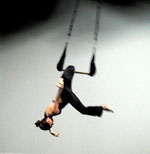


Meister Eckhart |
God is infinite in his simplicity and simple in his infinity. Therefore he is everywhere and is everywhere complete. God is in the innermost part of each and every thing.Johannes Eckhart was one of the greatest of Christian mystics. He was born at Hochheim in Thringen, Germany, in 1260, and entered the Dominican order when he was 15. Later he occupied several high posts in the order in Germany. Eckhart also taught theology at the Universities of Paris and Cologne. In 1326 Eckhart was formally charged with heresy by the archbishop of Cologne, Heinrich von Virneburg - who also prosecuted the Brethren of the Free Spirit in Cologne around this same time. The charge appears to have been proven. In 1329, shortly after Eckhart's death, Pope John XXII published a bull condemning 28 propositions from Eckhart's works. Eckhart is said to have retracted the errors. He claimed that he may have erred, but he was not a heretic. Probably his eminence protected him, for others who put forward similar views were indeed burned along with their works. By the standards of medieval Christianity, Eckhart was indeed a heretic. He stressed the unity of God and the capacity of the individual soul to become one with God during life. He asserted that the human soul was superior to the angels. And he spoke of passing beyond God to a `simple ground,' a `still desert,' without any distinctions, out of which all things were created - a conception strikingly similar to the Tao of Lao Tzu. Although he talks at times of God being in all things, Eckhart is never talking about glorifying the creation - modern theologians who cite him as a precursor of `creation spirituality' misrepresent him. Eckhart believes it is necessary to detach oneself from all sensible things, from all creatures and from the self, before the soul can be united with God. The God that is in all things has nothing to do with created matter: it is soul and thought. The texts are taken from Meister Eckhart, Selected Writings, translated by Oliver Davies, Penguin Books, 1994. Selected passages: God is one.God is pure oneness, being free of any accretive multiplicity of distinction even at a conceptual level. [Divine Consolation] There is neither distinction in God nor in the Persons of the Trinity according to the unity of their nature. The divine nature is one, and each Person is both One and the same One as God's nature. [On the Noble Man] God is in everything.God is infinite in his simplicity and simple in his infinity. Therefore he is everywhere and is everywhere complete. He is everywhere on account of his infinity, and is everywhere complete on account of his simplicity. Only God flows into all things, their very essences. Nothing else flows into something else. God is in the innermost part of each and every thing, only in its innermost part. [Sermon LW XXIX] The One descends into everything and into each single things, yet remaining the One that unites what is distinct. [Sermon LW XXIX] God . . . is the being of all beings.[Sermon LW XXIX] All creatures are one with God.All things are contained in the One, by virtue of the fact that it is one. for all multiplicity is one, and is one thing, and is in and through the One. . . The One is not distinct from all things. Therefore all things in the fullness of being are in the One by virtue of its indistinction and unity. [Sermon LW XXIX] When we know creatures in God, then that is called a `morning knowledge,' and in this way we see creatures without any distinctions, stripped of images and likeness in the Oneness which God himself is. [On the Noble Man] All creatures are the utterance of God. If my mouth speaks and declares God, so too does the being of a stone. [Sermon DW 53] However, to unite with God we must reject the world and ourselves. When we turn away from ourselves and from all created things, to that extent we are united and sanctified in the soul's spark, which is untouched by either space or time. This spark is opposed to all creatures and desires nothing but God. [Sermon DW 48] If we are to dwell in him . . . we should take leave of ourselves and of all things and be attached to nothing external which acts upon the senses within. [Sermon DW 40] When the soul enters the light that is pure, she falls so far from her own created somethingness into her nothingness that in this nothingness she can no longer return to that created somethingness by her own power. [Sermon DW1] Mystical union with God. The sixth [and highest] stage comes when we are stripped of our own form and are transformed by God's eternity, becoming wholly oblivious to all transient and temporal life, drawn into and changed into an image of the divine, and have become God's son. On the Noble Man Blessedness consists primarily in the fact that the soul sees God in herself . . . Only in God's knowledge does she become wholly still. There she knows nothing but essence and God. [On the Noble Man] Between that person and God there is no distinction, and they are one. . . Their knowing is one with God's knowing, their activity with God's activity and their understanding with God's understanding. [Sermon DW 40] Therefore it is in Oneness that God is found and they who would find God must themselves become One. . . And truly, if you are properly One, then you shall remain One in the midst of distinction, and the multifold will be One for you and shall not be able to impeded you in any way. [On the Noble Man When the soul is united with God, then it perfectly possesses in him all that is something. The soul forgets itself there, as it is in itself, and all things, knowing itself in God as divine, in so far as God is in it. [Sermon DW 58]. God is outside time.Nothing is as opposed to God as time. . . There is no process of becoming in God, but only a present moment, that is a becoming without a becoming, a becoming-new without renewal. . . All that is in God is an eternal present- time without renewal. [Sermon DW 50] God is thought.
Beyond God. I have occasionally spoken of a light in the soul which is uncreated and un creatable. . . . This light is not satisfied with the simple, still and divine being which neither gives nor takes, but rather it desires to know from where this being comes. It wants to penetrate to the simple ground, to the still desert, into which distinction never peeped, neither Father, Son nor Holy Spirit. There, in that most inward place, where everyone is a stranger, the light is satisfied, and there it is more inward than it is in itself, for this ground is a simple stillness which is immovable in itself. But all things are moved by this immovability and all the forms of life are conceived by it which, possessing the light of reason, live of themselves. [Sermon DW 48] Top of the Page Read the performance review Watch an interview with Robert Davidson the choreographer. |